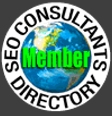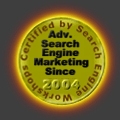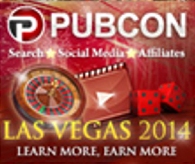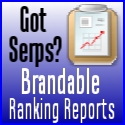 Look how old this is!
Look how old this is! I post at SearchCommander.com now, and this post was published 19 years 2 months 6 days ago. This industry changes FAST, so blindly following the advice here *may not* be a good idea! If you're at all unsure, feel free to hit me up on Twitter and ask.
In no particular order, here are the most important things I was either reminded of, learned, or remember from Pubcon.
- Always strive for perfection, but don’t wait for it before implementation, or you may never get your projects completed, your product ready, or your web pages uploaded, etc. In his keynote speech, Guy Kawasaki said one of his mantras is, “Don’t Worry, be Crappy!”. I’ve always believed this (to a degree), and it was nice to hear the reinforcement.
- Experts don’t always agree. A funny situation spanned two sessions. First, during the Dream Team Site Review session, Todd Freisen said “There’s never a good reason to do a 302 redirec. In the final presentation, “Search Engine Smackdown” from the show, Peter Linsley from Ask.com had a Powerpoint presentation. One of his slides was “Proper use of A 302 redirect”. Peter had obviously attended the earlier session, because when he came to that slide, he quickly skipped over it with no comment, emitting a chuckle from those in the audience that were paying attention.
- Buying too many links is bad and will cause penalization of a website in the search rankings. I suppose I’ve known this for a while, but it really hit home when I heard Thomas Bindl’s portion of a link buying presentation. Yes, a site can be penalized for buying “run of site” links, or for having too high a percentage of their inbound links be purchased, or for participating in link farms or cross linking schemes. This same presentation also included Patrick Gavin from Text Link Ads, and he too stressed the importance of not buying too many. All the presenters stressed that it’s important to keep a balance between your paid and organic links, and Thomas Bindl actually suggested that buying ANY links was a bad thing, even ones from co-panelist Patrick Gavin. Matt Cutts also said last year that buying links can’t help your ranking, but this year it was made clear that it can hurt them too.
- Alt tags still matter. This was said not only by a panelist, who mentioned their use, but was also confirmed by an SEO I met from Kansas City. He works frequently on a financial site, where they cannot make ANY text changes without a $140 per page submission to the SEC. He noticed that adding keyword rich ALT text to his images did improve his rankings. That’s why I stand by their continued inclusion in my “Top 10 SEO Tips“ article, despite the fact that most experts claim they’re worthless today. When used properly, they’re still a piece of the pie.
- Don’t link to bad neighborhoods. If I had a dollar for every time I’d heard this, I’d be a wealthy guy, but do I listen? Not always… Search your website and visit your link partners. Do they all offer a quality experience? Are they all directly related to your industry? Is there a legitimate reason for you to link there? If not, remove them ASAP. Improve the quality of your outbound links, remove the junk, and your rankings will improve
- Don’t show search engines session ID strings in your URL’s. Again, this isn’t exactly breaking news, but it was a strong takeaway for me because I specifically found out why. Last year, some search engines were still having trouble indexing dynamic URL’s. This year, they’ve gotten quite good at it, but that can still lead to other problems. If session ID strings are given to a search spider one day, then the next time it comes back, the same page provides a different ID, this can lead to duplicate content issues. It’s important to have programmers provide for this in their code, and set the store up so that if a visitor will not accept a cookie, (like a spider) then the URL will not include the session ID.
- RSS feeds are going to take over the world. Nobody actually said this, but I can sure see it coming. Already, IE7 will display an RSS feed in a much more user friendly way. Personally, I read blogs and articles through an RSS reader, and seldom visit the actual websites of my favorite authors any more. Last year, products began to trickle in to the market that helped publishers put advertisements right into their feeds. I think I realized this last year, when I put an RSS aggregator on my Palm Treo cell phone. But it was during this conference that I really began to believe that traditional websites might already be dead, and we just don’t realize it yet.
- Everything goes on your permanent record. During site reviews, it seemed that the first thing Matt Cutts did was to research what other domain names might be owned by the site owner, and then he would visit those domains as well, ultimately questioning the reasons for their existence. Why should it matter to Google what else I do in another domain, or if I have a bunch of domains parked? Well, I guess it does, and got the strong impression that you’d better not have anything they don’t like on any of your property.
- Resolving the www and the non www versions of a domain to the same place has been sort of an advanced seo secret for a long time, but at the last two Pubcons, I didn’t hear it mentioned in the review sessions. This year however, not a single domain that I saw got reviewed without looking at (and recommending) that 301 redirect for the non www version.
- 24 hours of unlimited internet access ends when you check out. Some late night activities (official of course) on Thursday kept me from renewing my daily internet access at my hotel Friday morning until about 11 am. Then, Saturday morning, I checked out early, knowing that I had access until I had to leave for the airport at 11. WRONG! It seems that by checking out about 9, I lost my access, and had to pay again just to use it for the last couple of hours before my flight.
Even though there were a few early disappointments, with a 45 minute registration line, and a couple of presenters that didn’t quite have it together, I thought the conference was great, and there’s no question I’ll return in 2007. I met a lot of people, learned some valuable information, and I consider it to be the one of my best educational investments of 2006.
Looking at my notes, I see there are more than 10, so maybe I’ll expand it to the top 20 when I have more time… If you attended Pubcon, what other things stick in your mind?



















